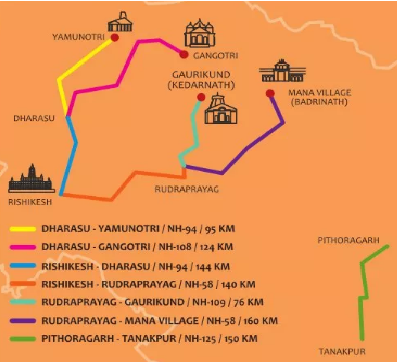Chardham Highway Project: Recent Developments
On December 2, 2020, the Supreme Court asked the committee monitoring the Char Dham Highway project to consider the applications from Defence Ministry. The Defence Ministry in its application is seeking to widen roads up to seven metres in the Indo China border area within 2 weeks.
On September 8, 2020, the Supreme Court asked the Road Transport and Highways Ministry to follow the circular of 2018 and stick to 5.5 metre carriageway width.
According to the Ministry of Defence, a carriage way width of seven metres is essential to facilitate the transport of heavy vehicles, troops, tanks, armaments and artillery. The roads listed by the Defence Ministry should be made suitable to quickly mobilize heavy equipment as these roads to be constructed under Chardham project are to connect with the line of actual control or the International border with China. Also, some of these roads connect the Indo-tibetan Border Police stations.
What is the issue?
Chardham Project, which is worth Rs.12,000 crore, aims to construct wider roads that would connect key pilgrimage spots in Uttarakhand. It has been a subject of controversy among environmentalists because of the involvement of hill cutting, which harms the mountain ecosystems. They view it to be in violation of SC orders on the road width to be followed in mountainous terrains. The Central government denies this allegation.
The Char Dham project will provide all weather connectivity to Gangotri, Yamunotri, Kedarnath and Badrinath. According to the environmentalists, the project will greatly affect the highly sensitive Bhagirathi Eco Sensitive zone. River Bhagirathi is the source stream of Ganga.
About Chardham Project
The agencies implementing the project are Ministry of Road Transport and Highways, Uttarakhand State Public Works Department, Border Roads Organisation and National Highway and Infrastructure Development Corporation Limited. It is being implemented on Engineering, Procurement and Construction (EPC) mode. Under the EPC mode, the project cost is completely borne by Government of India.
Month: Current Affairs - December, 2020


